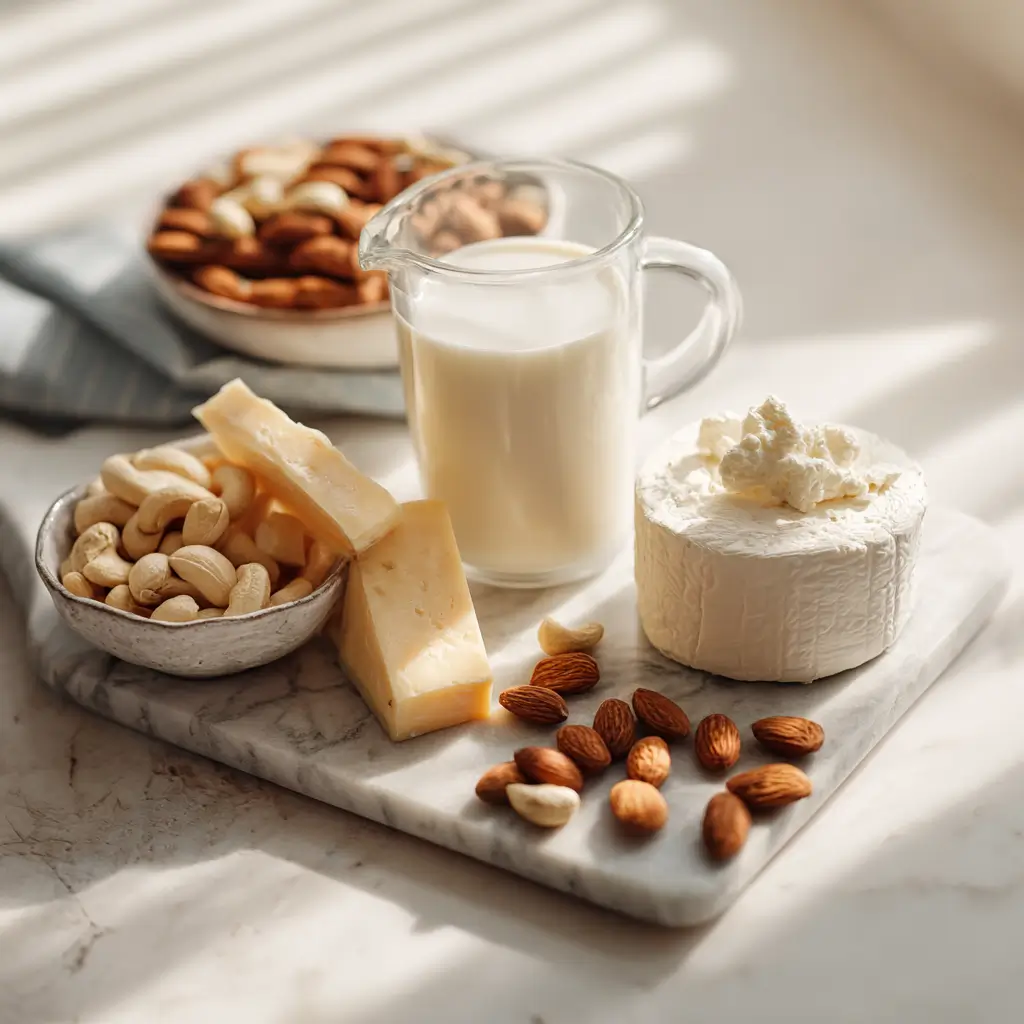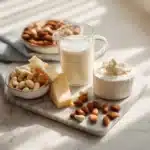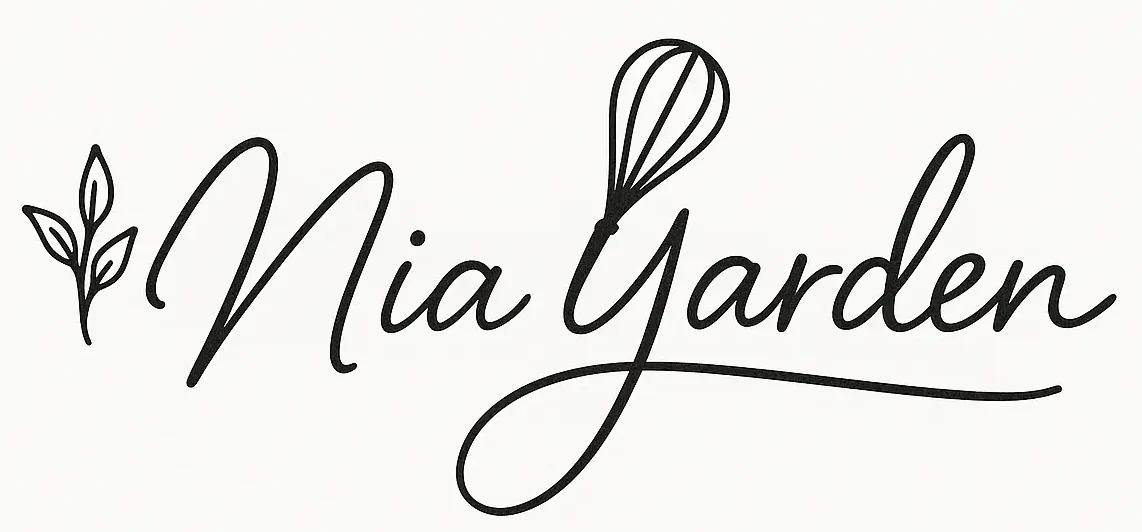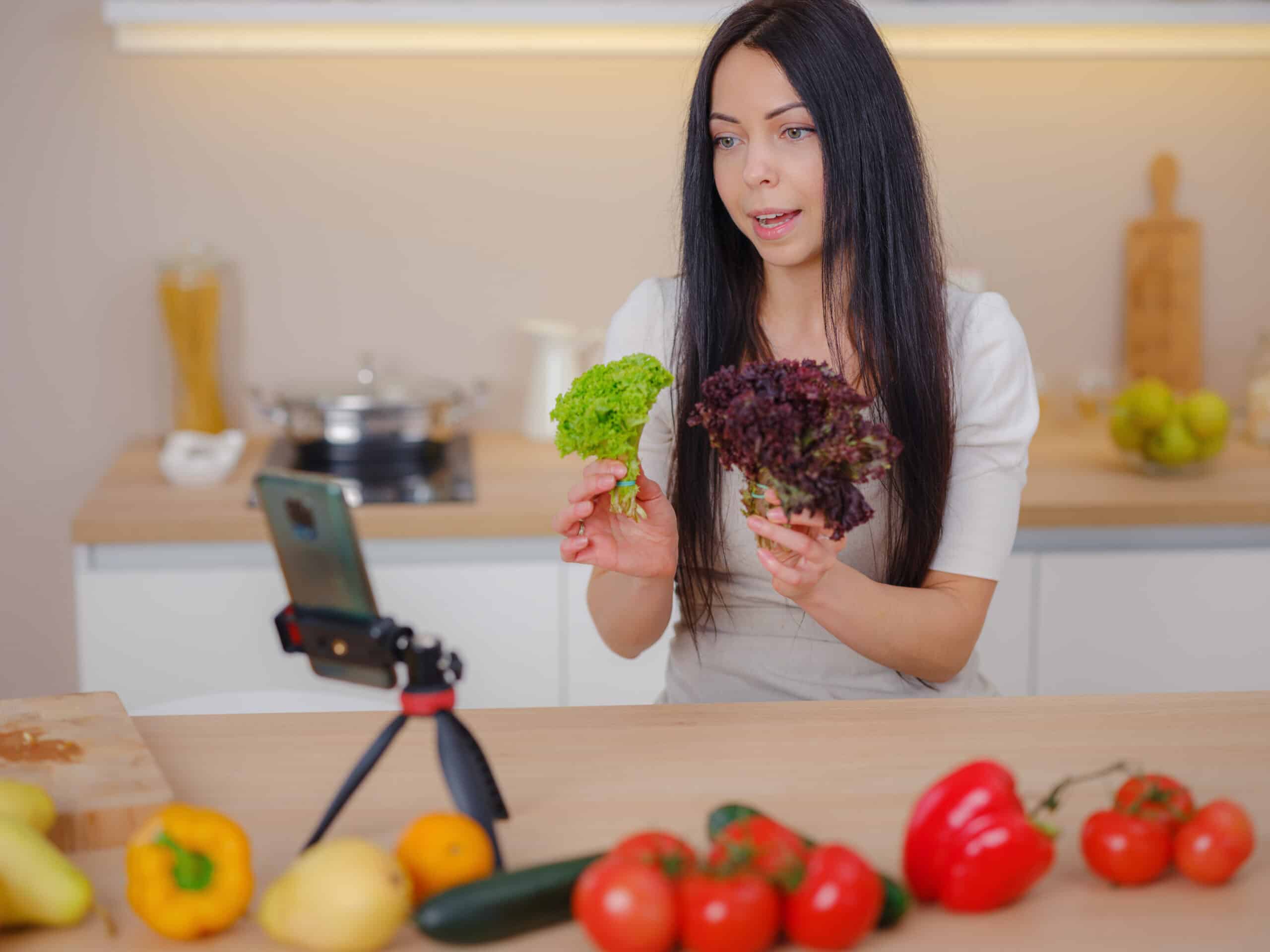Many people considering a plant-based diet ask the same question: Is vegan dairy-free? While the term “vegan” is often assumed to mean a diet free from all animal products, including dairy, the truth is slightly more complex. In this article, we’ll break down exactly what it means to be vegan, explore whether that always equates to being dairy-free, and guide you through common pitfalls when reading food labels or dining out.
If you’re wondering is vegan dairy-free for health or ethical reasons, you’re in the right place. From hidden dairy in “vegan” products to smart swaps and restaurant tips, this guide gives you everything you need to make informed choices. Looking for inspiration? Try this creamy dairy-free ice cream for a delicious start.
Table of Contents
Understanding the Vegan Label
What Does “Vegan” Really Mean?
When people ask is vegan dairy-free, they’re often confused about what the “vegan” label truly entails. A vegan diet eliminates all animal-derived ingredients—meat, fish, eggs, honey, and yes, dairy. That includes not only milk but also butter, cheese, yogurt, and anything containing casein, whey, or lactose.
However, not all products labeled “vegan” are regulated the same way. Some items may be produced in facilities that also process dairy, which can be a problem for those with allergies. That’s why understanding the difference between vegan-friendly and certified dairy-free is essential.
The Difference Between Vegan and Plant-Based
You might be thinking: if I follow a plant-based lifestyle, is that the same as being dairy-free or vegan? Not necessarily. A “plant-based” diet typically prioritizes fruits, vegetables, whole grains, and legumes, but it may still include small amounts of dairy or animal products. Veganism, on the other hand, is stricter and rooted in ethics—completely avoiding any animal byproducts, including dairy.
Check out our high-protein dairy-free protein shakes for a vegan-friendly way to fuel your day without worrying about milk ingredients.
If your goal is to be dairy-free due to health issues, asking “is vegan dairy-free” is a smart first step—but it’s just the beginning of the journey.
Is Vegan Always Dairy-Free?
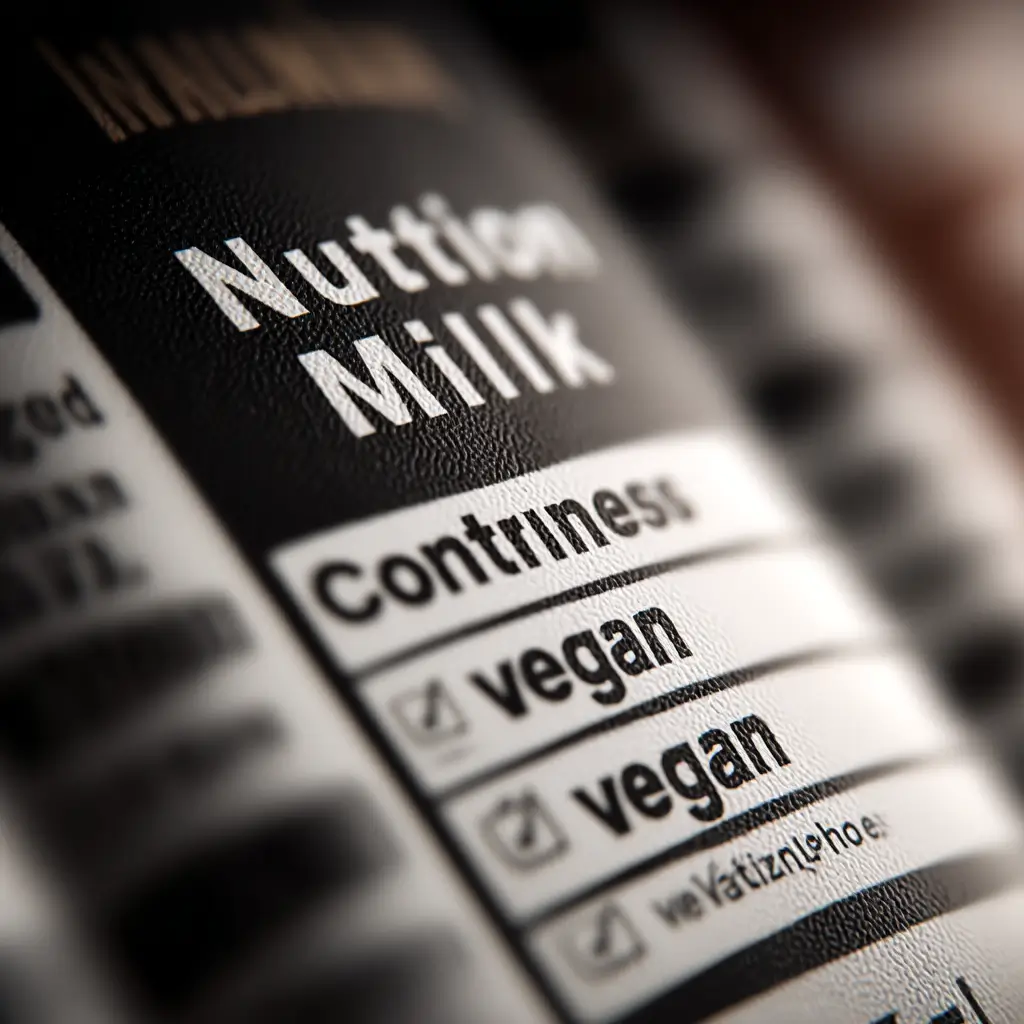
Why People Ask: Is Vegan Dairy-Free?
The question “is vegan dairy-free” often arises because food labeling in the U.S. can be misleading. While veganism excludes all animal products, including milk and its derivatives, not all vegan-labeled foods are safe for people avoiding dairy due to allergies or intolerances. Some may still contain trace amounts of dairy due to cross-contamination or lax labeling.
This becomes especially important for those with lactose intolerance or a true dairy allergy. For them, just seeing a “vegan” label isn’t enough assurance. Food manufacturers aren’t legally required to test for dairy cross-contact unless they’re making a dairy-free claim, which leads to confusion and potential health risks.
So, does vegan mean dairy-free? Most of the time, yes—but not always. That’s why asking the right questions and reading ingredient lists closely is key.
Discover great ideas like our rich dairy-free coffee creamer that’s 100% plant-based and perfect for both vegans and those who avoid dairy for health reasons.
Ingredients That Might Be Mistaken as Vegan But Aren’t
Even with labels, ingredient lists can trip people up. Some components that seem plant-based may still derive from milk or other animal sources. Here are a few red flags to watch for:
| Ingredient | Source | Vegan/Dairy-Free? |
|---|---|---|
| Casein | Milk protein | No |
| Whey | Milk byproduct | No |
| Lactose | Milk sugar | No |
| Ghee | Clarified butter | No (dairy, not vegan) |
| Lactic Acid | Usually plant-based | Often Yes |
| Caramel Color | Sometimes milk-derived | Check label |
Don’t miss our article: Is Ghee Dairy-Free? to understand more about sneaky ingredients you might not expect in “vegan” foods.
Even items marketed as vegan can sometimes sneak in controversial ingredients like shellac, honey, or natural flavorings that may not be dairy-free.
The takeaway? When you’re asking “is vegan dairy-free,” dig deeper than the front label.
Dairy Allergies vs. Vegan Choices
Is Vegan Safe for People with Dairy Allergies?
This is a crucial distinction for people dealing with food sensitivities. While vegan products should exclude all dairy by definition, the question “is vegan dairy-free” becomes critical for those with severe dairy allergies or lactose intolerance. Why? Because vegan labeling focuses on ethical and lifestyle considerations—not medical safety standards.
A vegan cookie, for example, may not contain milk or butter but could still be processed in a facility that handles dairy. This creates a risk of cross-contamination, which can be dangerous for individuals with dairy allergies.
The FDA does not mandate that vegan products be tested for dairy traces unless they are explicitly labeled “dairy-free.” That’s a big reason why asking is vegan dairy-free from an allergy perspective can yield a gray answer: often yes, but not guaranteed.
Learn more about navigating hidden dairy in indulgent treats like our dairy-free ice cream cake that’s both vegan and allergy-conscious.
If you’re dealing with a true allergy, always look for labels that say “certified dairy-free” or “produced in a dairy-free facility” in addition to “vegan.”
Hidden Dairy in “Accidentally Vegan” Products
Some foods aren’t marketed as vegan but happen to contain no animal-derived ingredients—these are called “accidentally vegan” products. Think chips, cereals, and even cookies. However, even if these don’t list milk as an ingredient, they might still have milk derivatives like:
- Caseinate
- Milk powder
- Whey protein
- Butter flavoring
- Modified milk ingredients
Always check allergen warnings, especially if you’re shopping for a child with dairy allergies or transitioning into a fully dairy-free lifestyle.
Check out our creamy dairy-free coffee ice cream for a safe indulgence that fits both vegan and dairy-free needs.
If you’ve ever wondered, “is vegan dairy-free enough for my allergy?”, the safest answer is: not always—read the label and look for allergy certifications.
Common Misconceptions About Vegan and Dairy
Does 100% Vegan Mean Dairy-Free?
One of the most frequent questions people ask when starting a plant-based lifestyle is: “Does 100% vegan mean dairy-free?” In theory, yes. Veganism by definition excludes all animal products, including dairy. So, a food labeled 100% vegan should be free of milk, butter, cheese, and other dairy-based ingredients.
But here’s where the confusion creeps in: some products may be labeled vegan because they contain no animal ingredients, yet they’re manufactured on shared equipment that processes dairy. That’s a red flag for people with milk allergies or severe sensitivities.
If you’re asking is vegan dairy-free because of a health issue, such as lactose intolerance or an allergy, make sure you look beyond the vegan label. Look for certifications like “Certified Dairy-Free,” and always read the allergen warning on the packaging.
Discover more in our guide to dairy-free pizza — a delicious example of how to enjoy cheesy flavors without dairy or risk of contamination.
Are Eggs and Honey Considered Dairy?
Another common misunderstanding is that eggs are dairy. They’re not. Eggs come from chickens, and dairy comes from mammals like cows, goats, or sheep. However, because both are often kept in the refrigerated section and used in similar ways (baking, breakfast foods), they’re often lumped together.
Honey is another gray area. While it’s not dairy, it’s avoided by many vegans because it’s produced by bees—an animal product. Still, some self-identified vegans consume it, depending on personal ethics.
Let’s clear it up:
| Item | Dairy? | Vegan? |
|---|---|---|
| Eggs | No | No |
| Honey | No | Sometimes No |
| Milk | Yes | No |
| Cheese | Yes | No |
| Almond Milk | No | Yes |
| Vegan Cheese | No | Yes |
So next time you’re wondering, “is vegan dairy-free and also egg-free?” — remember, a true vegan diet excludes both.
Everyday Foods — Are They Vegan or Dairy-Free?
Are Oreos, Bread, and Chips Truly Dairy-Free?
You’d be surprised how often everyday snacks and pantry staples raise the question: is vegan dairy-free when it comes to items like Oreos or sandwich bread. The short answer? Sometimes yes, sometimes no.
Take Oreos, for example. They’re famously accidentally vegan—they contain no dairy ingredients. But here’s the catch: the manufacturer states they may be cross-contaminated with milk during production. So, while vegans often eat them, they may not be safe for those with dairy allergies.
Let’s break down a few everyday items:
| Food Item | Vegan? | Dairy-Free? | Safe for Allergy? |
|---|---|---|---|
| Oreos | Yes | Likely | No (cross-contact) |
| Basic sandwich bread | Sometimes | Sometimes | Read label |
| Tortilla chips | Often | Often | Check for cheese dust |
| Pasta | Often | Often | Watch for egg or cheese |
| Instant noodles | No | Sometimes | Often has milk powder |
The key takeaway? If you’re asking is vegan dairy-free to avoid even traces of milk, double-check packaging and manufacturing processes.
Don’t miss our comparison of is sherbet dairy-free if you’re trying to satisfy a sweet craving without risking dairy exposure.
How to Read Labels for Hidden Dairy
Food labels can be tricky. Even if a product claims to be “non-dairy,” it might still contain milk-derived ingredients like caseinate or whey.
Here’s what to look out for on ingredients lists:
- Common Dairy Ingredients: Milk powder, butterfat, lactose, casein, whey
- “Hidden” Dairy Terms: Natural flavoring (can sometimes include dairy), caramel color, ghee, cream solids
- Certifications: “Certified Vegan” doesn’t always mean allergen-free. Look for “Dairy-Free” or allergy-specific labels.
Always scan for allergen warnings. If a product says “Processed in a facility that handles milk,” it might not be safe for dairy-sensitive individuals—even if it’s labeled vegan.
Vegan Substitutes for Dairy Products
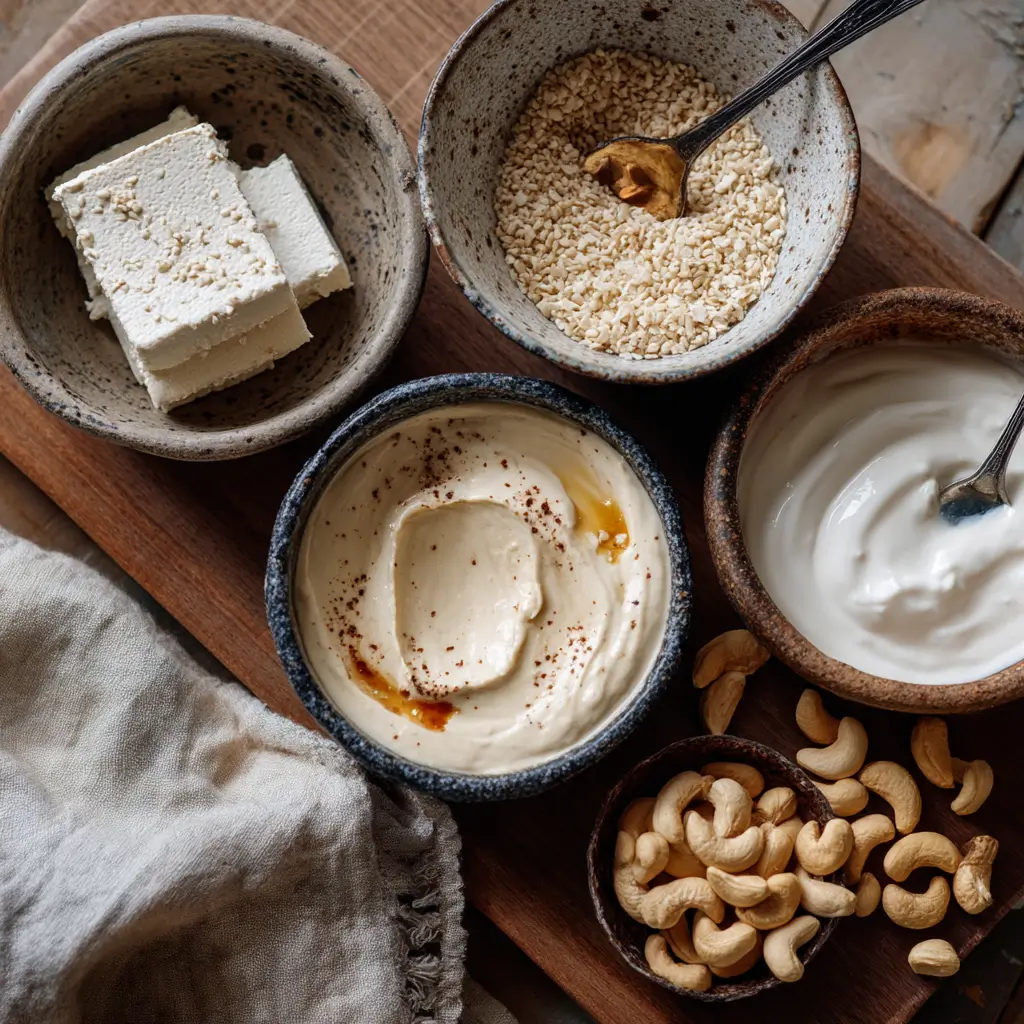
Popular Dairy-Free Alternatives in a Vegan Diet
When someone asks, “is vegan dairy-free,” the next logical question is: What do vegans use instead? The good news? There’s an abundance of tasty, accessible, and healthy substitutes for traditional dairy products.
Here’s a quick guide to popular vegan swaps:
| Dairy Product | Vegan Alternative | Flavor Profile |
|---|---|---|
| Milk | Almond, oat, soy, coconut milk | Mild, creamy, nutty |
| Butter | Plant-based butters, coconut oil | Buttery, neutral |
| Cheese | Cashew cheese, nutritional yeast | Savory, tangy, umami |
| Yogurt | Coconut yogurt, soy yogurt | Creamy, tangy |
| Ice Cream | Oat milk, coconut milk-based | Sweet, smooth, rich |
| Creamer | Almond or oat coffee creamer | Light, sweet, silky |
These options are often fortified with calcium and B12—key nutrients that dairy typically provides. For many, finding the right dairy-free version is what makes sticking to a vegan lifestyle not just doable, but delicious.
Learn more about our favorite dairy-free coffee creamer that’s perfect for your morning brew without a drop of dairy.
Homemade Vegan Dairy-Free Replacements
Going vegan and dairy-free doesn’t mean giving up comfort foods—you just get creative in the kitchen. Making your own dairy-free swaps is cost-effective and customizable.
Here are a few DIY alternatives you can whip up at home:
- Cashew Cheese Sauce: Soak cashews, blend with nutritional yeast, garlic, lemon juice, and plant milk for a creamy vegan “cheddar” dip.
- Vegan Sour Cream: Blend silken tofu with lemon juice, apple cider vinegar, and a pinch of salt.
- Oat Milk: Blend rolled oats with water, strain, and sweeten naturally with dates or vanilla.
If you’ve ever asked, “is vegan dairy-free and still satisfying?”, these alternatives prove it absolutely can be.
Want a sweet indulgence? Check out our ultra-creamy dairy-free ice cream that rivals any dairy version on the shelf.
Eating Out – Navigating Menus as a Vegan
Identifying Dairy-Free Options at Restaurants
When you’re dining out, it’s natural to wonder: is vegan dairy-free at restaurants, too? In theory, yes—but in practice, you need to be cautious. Just because something is labeled “vegan” on a menu doesn’t mean it’s dairy-free by allergy standards. Restaurants may use shared grills, deep fryers, or utensils, leading to cross-contact with milk products.
To minimize risk, here’s how to confidently navigate a menu:
- Ask questions: “Is this cooked with butter?” or “Do you use cheese in this sauce?” are great places to start.
- Look for clear labels: Many restaurants now mark items as vegan (V) and dairy-free (DF). Choose meals marked as both, when available.
- Opt for whole foods: Salads (without creamy dressings), veggie bowls, and grilled vegetables are often safer bets.
Looking for inspiration? Try this dairy-free ice cream cake recipe for a dessert you can recreate at home when restaurants fall short.
If you’re highly sensitive, let the staff know. Politely explain that you avoid all dairy, even in trace amounts, and ask about their kitchen practices.
What Questions to Ask When Ordering
It can feel awkward to grill your server, but it’s worth it—especially if you’re allergic. Here are some key questions to help clarify if your meal is truly dairy-free:
- “Is this dish prepared with any butter, milk, cream, or cheese?”
- “Do you have a dedicated grill or pan for dairy-free dishes?”
- “Are any sauces or dressings dairy-based?”
- “Does your bread contain milk or eggs?”
Even items like fries or grilled veggies might be cooked in butter instead of oil. And while servers might not always know all the ingredients, they can ask the kitchen to clarify.
Don’t miss our detailed guide on dairy-free pizza to find out which popular toppings and crusts are truly safe.
By being informed and asking the right questions, you’ll feel more confident eating out—and you’ll reduce the risk of dairy exposure while sticking to your vegan values.
Health Benefits and Considerations
Pros of Going Vegan and Dairy-Free
If you’ve ever asked yourself, “is vegan dairy-free and actually good for your health?”, the answer is often a resounding yes—when done right. Removing dairy and animal products from your diet can offer a variety of health benefits, especially when replaced with whole, nutrient-dense foods.
Some of the top benefits include:
- Improved digestion: Many people are lactose intolerant without realizing it. Cutting dairy often reduces bloating, cramps, and irregular bowel movements.
- Lower cholesterol levels: Dairy contains saturated fat. Going vegan often leads to lower cholesterol and improved heart health.
- Clearer skin: Dairy is linked to acne in some individuals. Many report clearer skin after removing milk, cheese, and cream.
- Reduced inflammation: A vegan, dairy-free diet rich in antioxidants and fiber can help lower inflammation and support joint health.
So, if you’re asking is vegan dairy-free enough to make a real impact on health?—yes, especially when your diet is rich in fruits, vegetables, legumes, nuts, and seeds.
Learn more about how to energize your day with dairy-free protein shakes packed with plant-based goodness.
Nutritional Gaps and What to Watch For
Despite the benefits, it’s also important to understand what you might miss when going vegan and dairy-free—so you can fill the gaps smartly.
Key nutrients to monitor:
| Nutrient | Why It Matters | Plant-Based Sources |
|---|---|---|
| Calcium | Bone health | Kale, fortified plant milks, tofu |
| Vitamin B12 | Nerve function, energy | Supplements, fortified cereals/milks |
| Omega-3s | Brain and heart health | Flaxseeds, chia seeds, walnuts |
| Vitamin D | Bone, immune health | Fortified foods, supplements |
| Protein | Muscle repair, energy | Legumes, lentils, quinoa, soy |
Going dairy-free doesn’t mean missing out—it just means planning smarter. Fortified plant milks, nutritional yeast, and B12 supplements help fill the gaps.
And if you’re still wondering, “is vegan dairy-free and nutritionally complete?”, the answer is yes—with proper attention and a little variety.
Lifestyle Tips and Transitioning Smoothly
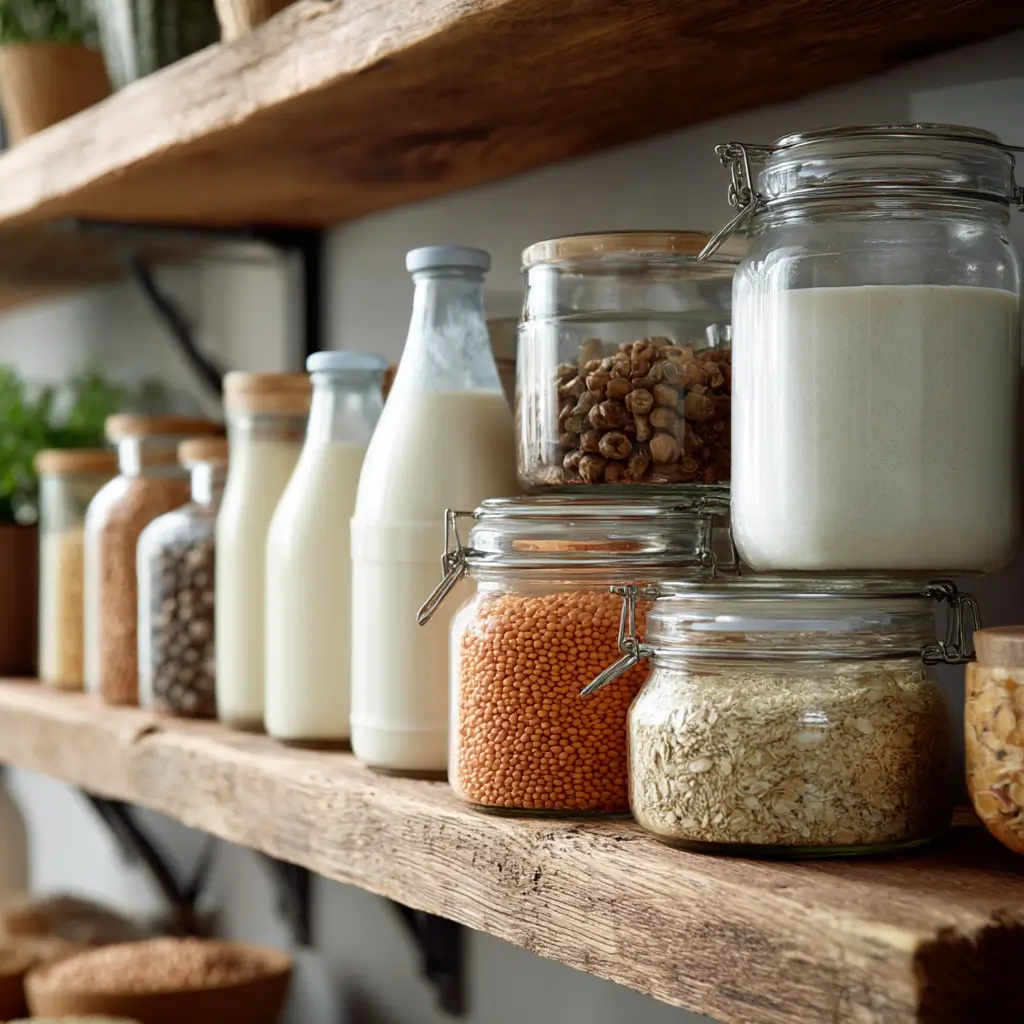
Switching to a Dairy-Free Vegan Diet
If you’re new to the lifestyle, the question “is vegan dairy-free and easy to stick with?” may be on your mind. The truth? With the right strategy and mindset, transitioning can be smoother than you expect.
Here’s how to start strong:
- Go slow: Don’t feel pressured to go fully vegan overnight. Start by removing obvious dairy like milk, yogurt, and butter, then work on hidden sources.
- Explore replacements: Try different plant-based milks, cheeses, and yogurts until you find what you like. Oat and almond milk are popular entry points.
- Plan your meals: Having dairy-free vegan meals prepped ahead helps avoid impulsive decisions, especially when you’re hungry.
- Track your symptoms: Notice changes in digestion, energy, or skin after going dairy-free. This helps reinforce the benefits and keep you motivated.
Check out our indulgent dairy-free ice cream for an example of how delicious dairy-free living can be.
Must-Have Pantry Staples and Shopping Tips
Stocking your kitchen with the right essentials makes living dairy-free and vegan a whole lot easier. Having trusted ingredients on hand eliminates the guesswork and helps you cook flavorful, nutritious meals on the fly.
Here’s a basic starter list:
| Category | Staples to Stock |
|---|---|
| Plant-Based Milks | Oat, almond, coconut, soy |
| Vegan Fats | Coconut oil, olive oil, avocado oil |
| Protein Sources | Lentils, beans, chickpeas, tofu, tempeh |
| Dairy-Free Condiments | Vegan mayo, tahini, hummus, salsa |
| Dairy Replacements | Vegan butter, vegan cheese, coconut yogurt |
| Baking Essentials | Flaxseeds, almond flour, non-dairy chocolate |
Don’t miss our guide to the best dairy-free coffee ice cream—a sweet example of how satisfying dairy-free can be.
Pro tip: Always read labels, even if the product says “vegan.” Brands often tweak formulas, and cross-contamination with dairy is still possible.
Whether your goal is ethical, environmental, or health-based, transitioning to a vegan, dairy-free lifestyle is absolutely achievable—and rewarding.
FAQs About Vegan and Dairy-Free Diets
Does 100% vegan mean dairy-free?
In most cases, yes. A 100% vegan product is expected to be free from all animal-derived ingredients, including dairy. However, if you’re asking u003cstrongu003e“is vegan dairy-free”u003c/strongu003e from an allergy standpoint, be cautious. Some products may be processed in facilities that handle dairy, which introduces the risk of cross-contamination. Always check for “dairy-free” certification if allergies are a concern.
Is vegan safe for dairy allergies?
Not always. While vegan products should exclude milk-based ingredients, they’re not always made in allergen-controlled environments. If you have a dairy allergy, don’t assume “vegan” is automatically safe. Look for allergen warnings and certified dairy-free labeling.
Does vegan automatically mean dairy-free?
Not by FDA standards. Vegan typically means no animal ingredients, but it doesn’t guarantee the product is free from dairy traces or made in a dairy-free facility. If you’re asking u003cstrongu003e“is vegan dairy-free”u003c/strongu003e to avoid dairy due to health reasons, be sure to read the full label carefully.
Are eggs considered dairy?
No. Eggs are not dairy—they come from chickens, not mammals. However, they are not vegan. A vegan diet excludes both dairy and eggs, so any vegan product will also be egg-free.
Are Oreos dairy-free?
Oreos are considered “accidentally vegan,” meaning they don’t list animal-based ingredients. However, they are made in facilities that handle milk, so they’re not guaranteed to be dairy-free for allergy-sensitive individuals.
Can vegans eat bread?
Yes, most breads are vegan and dairy-free, especially basic varieties like sourdough, pita, or baguettes. However, some breads contain milk, butter, or honey, so it’s important to read the label if you’re strict about avoiding dairy or animal products.
Conclusion: So, Is Vegan Dairy-Free?
To wrap it all up—is vegan dairy-free? The answer is usually, but not always. While the core principle of veganism excludes all dairy, the reality in grocery stores and restaurants isn’t always that simple. Whether you’re vegan for health, ethical, or allergy-related reasons, it’s crucial to read labels, ask questions, and choose certified dairy-free options when needed.
The good news? With the rise in plant-based living, there are more dairy-free and vegan-friendly options than ever before. From rich dairy-free protein shakes to indulgent dairy-free pizza, living a lifestyle that’s both ethical and safe is completely within reach.
Want daily inspiration and easy recipes for a dairy-free vegan lifestyle?
Follow us on Pinterest and Facebook for new ideas, tips, and mouthwatering dishes to make your journey fun and flavorful.
Dairy-Free Vegan Lifestyle Guide
A comprehensive guide exploring the relationship between veganism and dairy-free diets, including tips for making informed choices and popular substitutes.
- Prep Time: 30 minutes
- Cook Time: 0 minutes
- Total Time: 30 minutes
- Yield: 4 servings
- Category: Dietary Guide
- Method: N/A
- Cuisine: Vegan
- Diet: Vegan, Dairy-Free
Ingredients
- Almond milk
- Coconut milk
- Plant-based butter
- Cashew cheese
- Nutritional yeast
- Coconut yogurt
- Oat milk
- Silken tofu
- Chickpeas
- Lentils
Instructions
- Understand the differences between vegan and plant-based diets.
- Identify dairy ingredients in everyday foods.
- Experiment with homemade dairy substitutes.
- Plan meals to avoid impulsive decisions.
- Read labels carefully to check for hidden dairy.
- Ask questions when dining out to ensure meals are dairy-free.
Notes
Transitioning to a vegan, dairy-free lifestyle can be smooth with the right strategies and preparation. Always check for dairy-free certification for allergy-sensitive individuals.
Nutrition
- Serving Size: 1 guide
- Calories: 200
- Sugar: 8g
- Sodium: 300mg
- Fat: 10g
- Saturated Fat: 5g
- Unsaturated Fat: 4g
- Trans Fat: 0g
- Carbohydrates: 25g
- Fiber: 6g
- Protein: 8g
- Cholesterol: 0mg
